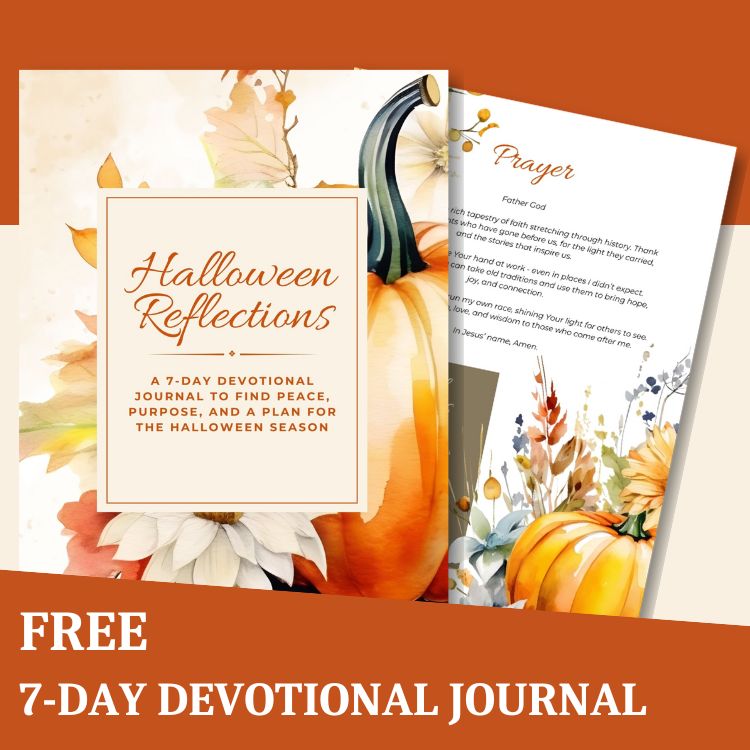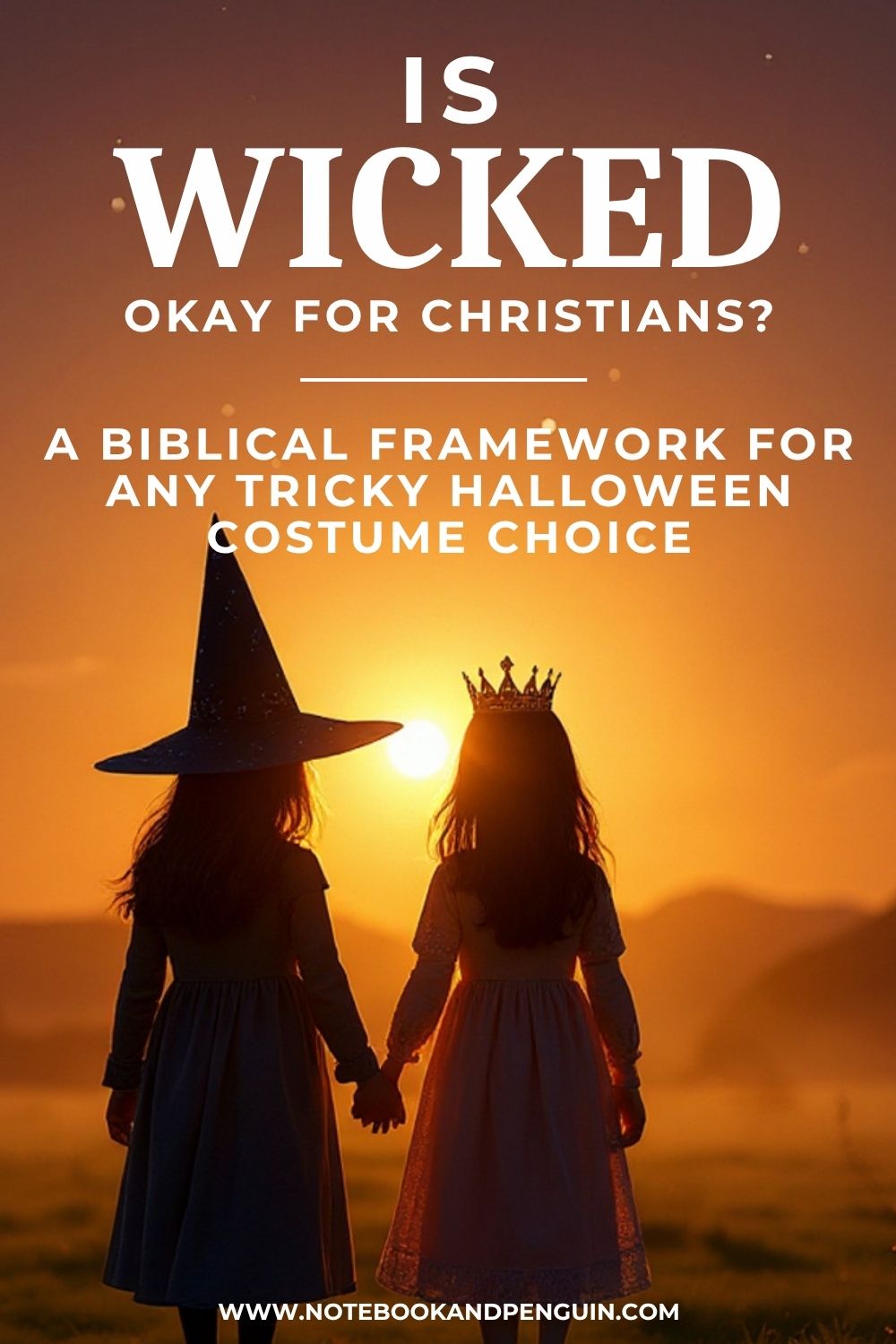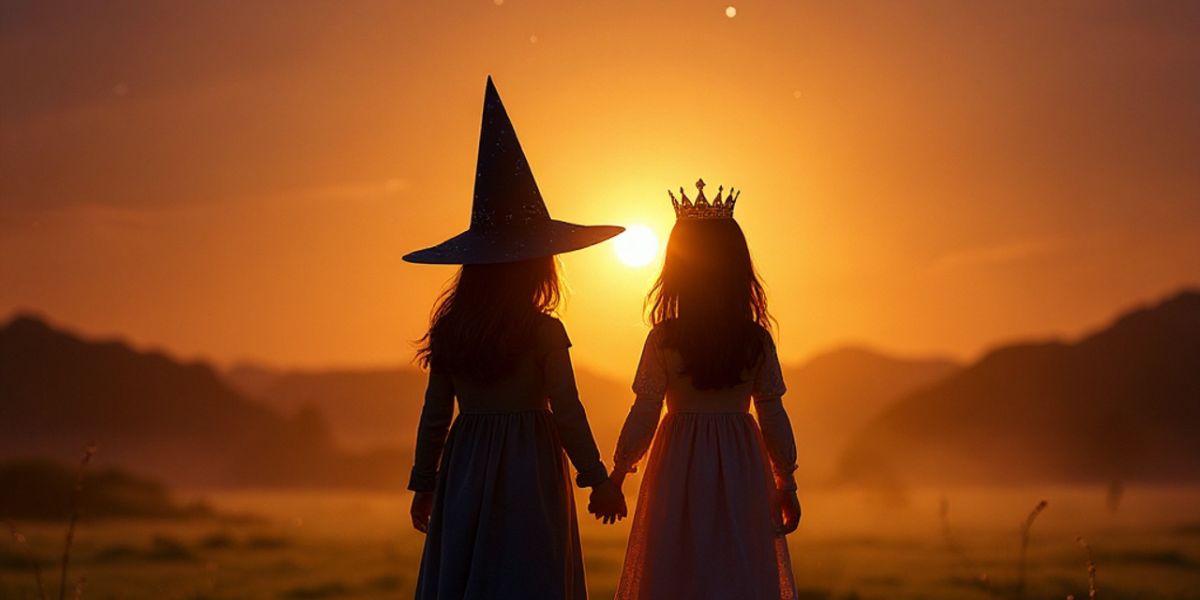Wondering if those ‘Wicked’ costumes are okay?
This post may contain affiliate links which means we might earn a small commission if you decide to make a purchase through them (at no extra cost to you). Need more info? Click Here
Discover a practical, biblical framework for making Halloween decisions that strengthen your family’s faith instead of causing fear.
Recently, a reader left a comment on our post about Christians and Halloween that I haven’t been able to stop thinking about. She wrote:
“I am so glad you made this post. I have been wrestling this hard and have been at war with myself over Halloween. My question is, my girl’s costumes are ‘Glinda’ & ‘Elphaba’ from the movie ‘Wicked’, should we allow this or change costumes?”
If you are a Christian parent, you’ve most certainly stood in a costume aisle or browsed online with a knot in your stomach, wondering if a fun character costume aligns with your faith.
This question – “Is this okay for us?” – goes far beyond Halloween and straight to the heart of how we make our way through the gray areas of modern culture.
We see magical and mysterious themes everywhere: the magical world of Harry Potter, the epic battles of The Lord of the Rings, and the incredible adventures in The Chronicles of Narnia – the latter two of which were written by devout Christians (J.R.R. Tolkien and C.S.Lewis). Each of these stories, just like Wicked, uses fantasy elements to explore deep truths about good, evil, friendship, and sacrifice.
I think that, rather than giving a strict “yes” or “no”, our ultimate job as parents isn’t just to build fences to keep our children safe but rather to equip them with a compass to guide them, especially when we’re not there.
Halloween gives us the perfect opportunity to use something “simple” like choosing a costume, to begin a conversation where we can teach our kids to ask deeper questions like, “What is this story really about?“, “Why does this character do what they do?” and “Does this story or decision help or hinder me or my walk with God?“
These types of conversations teach kids discernment, and they empower them to make wise decisions as they navigate the world.
So, unfortunately, this article won’t give you a simple “yes” or “no” answer. Instead, I hope that it will help give you a biblical framework for discernment that you can use and apply to any costume, book, movie, or anything else.
Don’t forget to check out our other Christian Halloween Articles:
- Should Christians Celebrate Halloween? Find Peace With Your Halloween Decision
- 20+ Key Bible Verses For Halloween
- Fun Ways For Christians to Celebrate Halloween Without the Guilt!
- Christians Are Like Pumpkins – A Modern Day Parable
- 25+ Christian Trunk or Treat Ideas That Share God’s Love
- 30+ Really Fun Halloween Costume Ideas For Christians
Understanding the Story: What is “Wicked” Really About?
Let’s take a quick look at what Wicked is really about. It is the prequel to The Wizard of Oz and takes place in the magical world of Oz. It tells the story of the Wicked Witch of the West (Elphaba) and the Good Witch Glinda. Its core themes are:
- The Nature of Evil: The story explores how people and systems sometimes label others as “wicked,” often out of fear, prejudice, or a desire for power – Elphaba, the “Wicked Witch” is born green and is an outcast. These are powerful lessons in today’s world!
- Unlikely Friendship: The heart of the story is the beautiful, complex, loving, and challenging friendship between Elphaba and Glinda.
- Fantasy, Not Occult: The “magic” and “witch” titles are elements of fantasy storytelling that are set in the same universe as the fearful lion and the talking scarecrow, and I don’t think that they promote or depict real-world witchcraft or occult practices – much like the magic of Cinderella’s fairy godmother or the pixie dust in Peter Pan.
I think that understanding this context is the first step in moving from a place of fear to a place where you can discern what choice to make.
The Two Common Christian Perspectives About Wicked Or Other Fantasy Genres
Within the body of Christ, you’ll generally find two thoughtful viewpoints on this issue:
Avoidance
This view takes its cue from 1 Thessalonians 5:22, which tells believers to “abstain from every form of evil” (ESV). For many Christians, this means avoiding any imagery or content associated with witchcraft, magic, or darkness – regardless of its fictional context.
Discernment
This viewpoint tries to differentiate between fantasy storytelling and the actual occult. It looks at the intention and context of the content.
Christians with this view might enjoy stories like The Chronicles of Narnia, The Lord of the Rings, or The Wizard of Oz itself. They might see the magical elements as parts of the story rather than spiritual threats. They might ask themselves questions like, “What does this story represent?” or “What is our motivation behind enjoying it?“
I believe that both of these perspectives are held by sincere, Bible-believing Christians.
So how do you, as a parent, decide?

Should Christians Celebrate Halloween?
If you’re unsure, this simple 7-day devotional will help you pray, reflect, and make a thoughtful decision – for yourself and your family.
Includes full-color and printer-friendly versions. Works in note-taking apps too!
A Framework for Discerning Halloween Choices
Instead of looking for a hard-and-fast rule, here are four questions to pray over and talk about as a family.
The Motivation
- “Why are we drawn to this costume?”
- Is it for the love of the music, the vibrant costumes, and the themes of friendship? Or is it a fascination with the darkness, the “wicked” label, or the rebellious spirit of the character? “People look at the outward appearance, but the Lord looks at the heart” (1 Samuel 16:7). Our motivation matters.
The Message
- “What values does this character represent?”
- Does the character embody positive traits like courage, loyalty, or defending the oppressed (as Elphaba does)? Or do they glorify evil, malice, deceit, or the occult? Are you comfortable having your child represent that message, even for just one night?
Your Conscience and Witness
- “Could this cause me or someone else to stumble?”
- This is a two-part question from 1 Corinthians 8 and 1 Thessalonians 5:22.
- Internally: Does wearing this costume bother your conscience, or could it upset a fellow believer who might see it? If you feel a persistent pull in your spirit, it’s wise to listen.
- Externally: How might this costume be perceived by non-Christian neighbors? Could it create confusion about what your family stands for? Our freedom is important, but so is our witness.
Honoring God
- “Can we do this in a way that honors God?”
- This is the filter from 1 Corinthians 10:31: “So whether you eat or drink or whatever you do, do it all for the glory of God.” Can this fun, family activity be transformed into something that reflects the joy and light of Christ?
Awesome Alternatives: Celebrating Heroines of Faith
If, after praying through the questions above, you decide that different costumes would be a better fit for your family, then these ideas are for you!
I think that sometimes we forget just how many strong, brave, and inspiring characters there are in the Bible – with many of them being women! Why not celebrate these women and their incredible stories during Halloween?
Here are a few ideas to get you and your daughters excited (also, don’t forget to check out our list of both biblical and non-biblical costume ideas that are perfect for Christian families!):
Queen Esther
A beautiful Jewish queen who bravely risked her life to approach the king and save her entire people from being slaughtered. Her story is an awesome example of God’s protection, authority, and how using your voice for what is right can truly make a difference in the world!
Biblical Reference: The Book of Esther
Deborah
A warrior and a judge! Deborah was the only female judge of Israel. She was also a prophetess and fearless leader who guided her people into battle against their oppressors, which led to peace and security.
Biblical Reference: Judges 4-5
Miriam
The brave big sister of Moses! She watched over her baby brother as the Pharaoh’s daughter adopted him into her household. She also bravely approached Pharaoh’s daughter and cunningly arranged for their mother to take care of Moses. As a woman, Miriam was right there beside Moses as he led the people through the Red Sea as they escaped the Egyptian army.
Biblical Reference: Exodus 2:1-10; 15:20-21
Rahab
An unlikely heroine! She lived in the city of Jericho and bravely hid the Israelite spies, trusting that they would save herself and her family when the city was conquered. Because of her courage and faith, she is named in the genealogy of Jesus!
Biblical Reference: Joshua 2:1-21; 6:22-25 (Read more about Rahab here)
Ruth
The perfect symbol of loyalty, sacrifice, and love! She courageously left her home with her Israelite mother-in-law, Naomi. Her bravery and faithfulness led her to become the great-grandmother of King David!
Biblical Reference: The Book of Ruth
The Queen of Sheba
A beautiful and powerful queen who traveled a long way to test the wisdom of King Solomon. She was left in awe and praised God for what she saw and learned.
Biblical Reference: 1 Kings 10:1-13
I love these ideas because, not only can you create some really great costumes, but they are also amazing conversation starters and a way to bring the Bible to life. Kids often love dressing up as Biblical characters when they learn about all the amazing and brave things that they accomplished in their lives!
Making Alternative Costume Ideas Exciting for Kids
So, you’ve decided to pick different costumes. Now comes the fun part: making the new choice feel just as special, if not more so, than the original idea!
This isn’t about saying “no”; it’s about saying “yes” to an even better idea!
The key is to frame it with excitement and focus on the story of the costume. Here are a few ideas:
Focus on the Adventure, Not Just the Character
Kids love action and heroics. Don’t just say, “Let’s be Queen Esther.” Say, “Let’s be the incredibly beautiful and brave queen who saved thousands of people from the bad guy! We can make a beautiful crown and a royal scroll.” Frame it as stepping into an exciting story.
Make it a Project
Involve your kids in every step of the process. The bonding happens during the making, not just the wearing.
- Research together: Look up pictures of ancient Israelite clothing or what the palace in Persia might have looked like.
- Craft together: “Let’s make Miriam’s tambourine!” or “We can dye this fabric to make Rahab’s scarlet rope!“
- Shop together: Turn a trip to the fabric or craft store into a treasure hunt for costume materials.
Empower Them with the Story
Watch an animated Bible story video about the character together. Read the story from a children’s Bible at bedtime in the weeks leading up to Halloween. When your kids understand the courage of Deborah or the loyalty of Ruth, they feel empowered to become that character. They’re not just wearing a costume; they’re embodying a hero.
Connect it to Their World
Draw parallels they understand: “Esther was brave like Elsa and she used her bravery to save all the people in her kingdom.” “Deborah was a leader, a warrior, and a judge, just like a superhero!“
Present it as a Unique Opportunity
Frame your ideas as a chance to be fun and original. “Everyone will be Elphaba, but you get to be an awesome queen that most people haven’t even thought of! You’ll be unique and teach people about a real-life hero!“
By using some of these ideas you can take a moment that could be disappointing for your kids and turn it into a creative, faith-building family experience that creates memories!
Final Thoughts
So, back to the original question: Glinda and Elphaba – yay or nay?
The truth is, I can’t answer that for you. But you and the Holy Spirit can!
If you feel unsettled in your spirit and you feel like He is leading you in a different direction, then embrace that decision and find other fun and creative ways to enjoy dressing up with your kids. Avoid disappointment by making what you choose extra special and fun. Perhaps try speaking to other families about the idea of creating group costumes or themes that the kids can enjoy with their friends!
If you find yourself at peace with a “yes”, then have fun with it! Emphasise all the good points about each character your kids choose and allow them to embrace those positives!
I believe that there is grace for both decisions and that the goal should never be to scare our kids but rather to use moments like these to teach them how to make good decisions, helping them to make their way through the world with wisdom, critical thinking, and a heart that honors God.
What are your thoughts? How does your family navigate tricky costume choices? Share your experiences in the comments below, and let’s learn from and encourage each other!
If you found this article helpful, please pin it so others can find it to!





